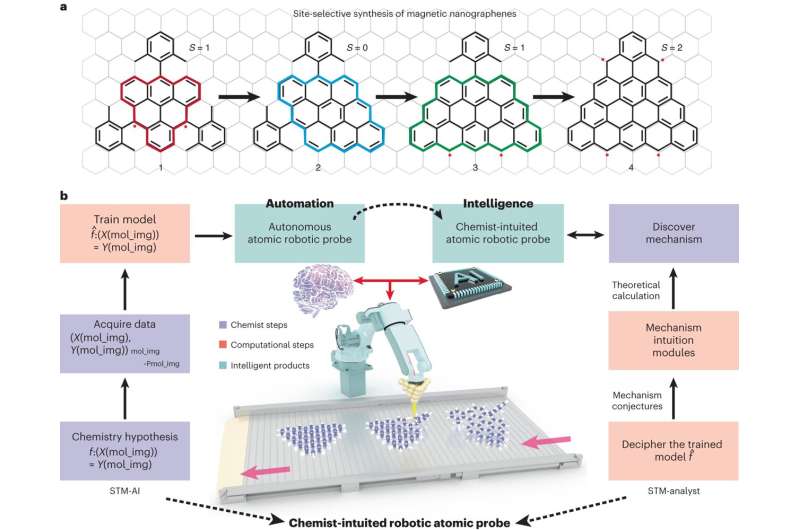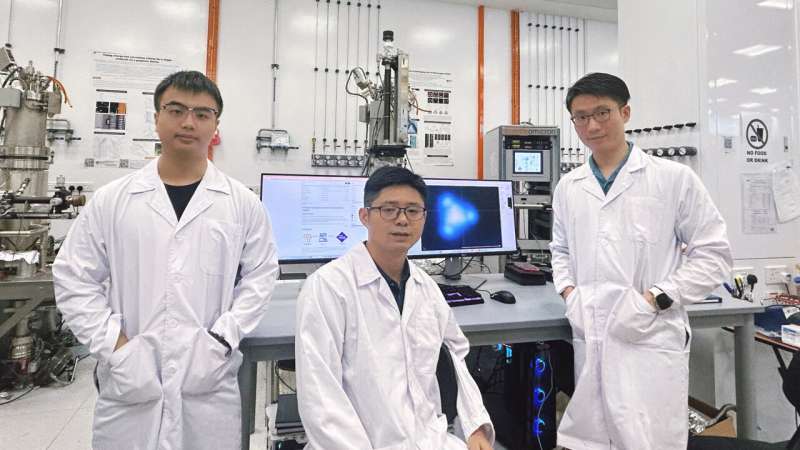
A workforce of NUS researchers led by Affiliate Professor Lu Jiong from the Division of Chemistry and Institute for Purposeful Clever Supplies, along with their worldwide collaborators, have developed a novel idea of a chemist-intuited atomic robotic probe (CARP).
This innovation, which makes use of synthetic intelligence (AI) to imitate the decision-making strategy of chemists, permits the manufacturing of quantum supplies with unequalled intelligence and precision for future quantum expertise purposes equivalent to knowledge storage and quantum computing.
Open-shell magnetic nanographene is a sort of carbon-based quantum materials that possesses key digital and magnetic properties which can be necessary for growing extraordinarily quick digital units on the molecular level, or creating quantum bits, the constructing blocks of quantum computer systems. The processes used to develop such supplies have progressed over time due the invention of a brand new sort of solid-phase chemical response often known as on-surface synthesis.
Nonetheless, it stays difficult to exactly fabricate and tailor the properties of quantum supplies on the atomic level as a result of this requires a better degree of selectivity, effectivity and precision which the on-surface synthesis method is unable to offer. This limits the applicability of open-shell magnetic nanographene for future expertise.
Assoc Prof Lu explains, “Our foremost objective is to work on the atomic degree to create, research, and management these quantum supplies. We’re striving to revolutionize the manufacturing of those supplies on surfaces to allow extra management over their outcomes, proper all the way down to the extent of particular person atoms and bonds.”
The research was carried out in collaboration with Affiliate Professor Zhang Chun from the NUS Division of Physics and Affiliate Professor Wang Xiaonan from Tsinghua College.
The analysis breakthrough was published in Nature Synthesis on 29 February 2024.

Creating a brand new idea for nanotechnology
By combining scanning probe microscope strategies with deep learning, the analysis workforce enabled the microscope to hold out exact fabrication of a carbon-based quantum materials referred to as magnetic nanographenes. This modern method additionally permits this “sensible” microscope to extract detailed chemical info, aiding in understanding beforehand unknown mechanisms.
A big side of this new idea is its potential to harness the experience and instinct of human floor chemists via a deep neural framework inside the CARP. This framework permits the microscope to manufacture particular quantum supplies whereas working in real-time. To attain this, the analysis workforce developed numerous layers of convolutional neural networks, a sort of deep studying mannequin used for picture recognition and processing.
The analysis workforce then examined the CARP framework by coaching it utilizing the knowledgeable data of site-selective cyclodehydrogenation. Found by Dr. Su, site-selective cyclodehydrogenation is a fancy however important technique to synthesize nanographenes.
The CARP framework reveals a passable efficiency in offline and real-time operations, and it manages to set off the single-molecule reactions at a scale smaller than 0.1 nanometer. That is the primary time a probe chemistry response is reported to be assisted by AI.
CARP: From autonomation to intelligence
The analysis workforce not solely expects the CARP framework to conduct autonomous operations on the atomic scale however goals to maximise the potential of AI to know deep info hidden within the database. To attain this, the workforce established a studying paradigm to look at the framework’s studying outcomes utilizing a game-theory-based method.
The evaluation outcomes point out that the CARP successfully captured some options that is likely to be essential for the profitable synthesis of nanographene via cyclodehydrogenation, which could be difficult for human operators to note. The CARP additionally confirmed potential in dealing with versatile probe chemistry reactions when examined with unknown single-molecule reactions.
“Our objective within the close to future is to increase the CARP framework additional to undertake versatile on-surface probe chemistry reactions with scale and effectivity. This has the potential to remodel typical laboratory-based on-surface synthesis course of into on-chip fabrication for sensible purposes. Such transformation may play a pivotal position in accelerating the basic analysis of quantum issues and usher in a brand new period of clever atomic fabrication,” added Assoc Prof Lu.
Extra info:
Jie Su et al, Clever synthesis of magnetic nanographenes through chemist-intuited atomic robotic probe, Nature Synthesis (2024). DOI: 10.1038/s44160-024-00488-7
Supplied by
National University of Singapore
Quotation:
Producing quantum supplies with precision, with the assistance of AI (2024, March 1)
retrieved 1 March 2024
from https://phys.org/information/2024-03-quantum-materials-precision-ai.html
This doc is topic to copyright. Other than any honest dealing for the aim of personal research or analysis, no
half could also be reproduced with out the written permission. The content material is offered for info functions solely.







